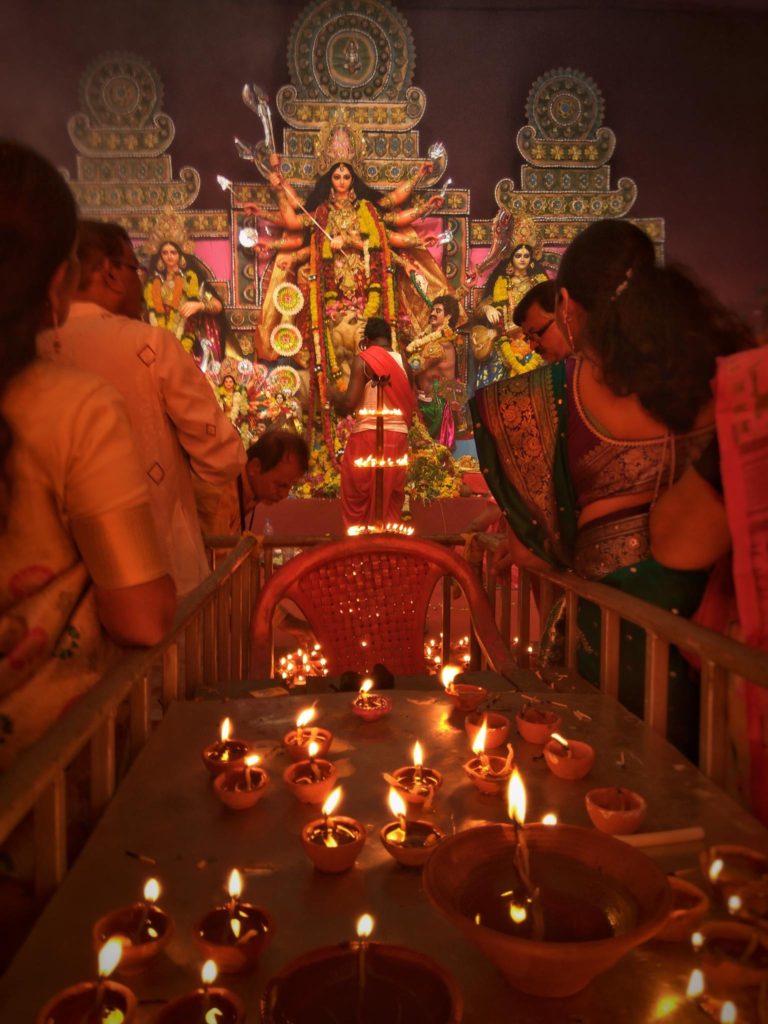It’s that time of the year. Fall is in the air and it’s time for the #FallWritingFrenzy contest! Thanks, Kaitlyn Sanchez, Lydia Lukidus, Ameerah Holiday for the opportunity.
In India where I grew up, fall is also a time of festivities. The celebrations start and just keep going at this time. Ganesh Chaturthi, Durga Puja, Navratri, Dushera, Diwali…it’s one big festival. The image that spoke to me this time was a picture of Durga Puja being celebrated.
Before we get into the story a brief introduction
Durga Puja is a ten-day festival that pays homage to the Goddess, Durga. The festival marks the victory of Goddess Durga in her battle against a shape-shifting demon. Essentially, it symbolizes the victory of good over evil. The tradition is to welcome the Goddess after her battle to her parents’ home. Communities come together and make an idol of clay that looks like Durga. For ten days she is revered, celebrated, and loved. On the last day, she is sent back to her husband’s house and the idol is immersed in water. Before she leaves, on the last day, there is a ritual called Sindur Khela that is celebrated.
Sindur Khela literally means Game of Vermilion. On Sindur Khela, women smear vermilion on each other’s faces wishing each other long and happy married lives. Vermillion is usually worn by married women. Hence, Sindur Khela traditionally excluded unmarried women and widows. But recent campaigns are pushing to include all women – married, widowed, transgender – in the rituals making Sindur Khela an occasion to celebrate womanhood together.
Words to know:
Mashi: Aunt in Bengali, a language spoken in some states in eastern India where Durga Puja is widely celebrated.
Dadi: Grandmother in Bengali, a language spoken in some states in eastern India where Durga Puja is widely celebrated.
Mesho: Uncle in Bengali, a language spoken in some states in eastern India where Durga Puja is widely celebrated.
Here is the picture and my piece –

PLAYING WITH BINDU MASHI
Word Count 197
Today is the tenth day of Durga Puja – time to play Sindur Khela!
Ma says, “Married women will smear vermillion on each other’s foreheads and cheeks.”
At the door,
draped in saris,
everyone dazzles in white, red, and gold,
Everyone, except –
“Bindu Mashi, where are you?” I yell.
Dadi grumbles.
Ma nudges me and whispers, “Shh!”
And Bindu Mashi?
Bindu Mashi stays quiet.
I let myself be dragged away, still asking, “Why can’t Bindu Mashi play?”
Is it because after Ramesh Meso passed away, Bindu Mashi is not married anymore?
The Pujo starts.
Conch shells blow,
red flames dance,
and dhak beats fill the air.
At the dais, the Goddess glows –
locks loose,
astride on her beast,
fire in her lotus eyes,
and fury in her hands.
Fearless.
Victorious.
At peace.
She looks at me and smiles.
Suddenly, I know what to do!
I break my hands free and run home for Bindu Mashi.
But halfway there,
I stop.
For standing there is Bindu Mashi,
Dazzling in white, red, and gold.
I hold her hand and march inside.
Dadi grumbles but,
Ma nudges and whispers to Dadi, “Shhh.”
And Bindu Mashi?
Bindu Mashi says,
“Come, Gauri, let’s play,”
Concluding Author’s Note:
As a child, I remember an incident when, as part of a different ritual, I was whispered instructions not to offer vermillion to widows. Something about that troubled me as isolating and unfair. Even though I didn’t question it aloud that day, I always wished I had. Maybe it could have been done differently. When I saw the image of Durga Puja for #FallWritingFrenzy and began thinking of the different rituals during the festival, including Sindur Khela, I remembered that particular incident. In this story, Gauri, my protagonist asks, “Why?” and all change begins with “Why.”